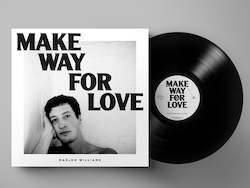Marlon Williams / Make Way For Love Vinyl LP

Marlon Williams' acclaimed 2018 album Make Way For Love on Vinyl LP.
Marlon Williams has, quite simply, one of the most extraordinary, effortlessly distinctive voices of his generation â a fact well known to fans of his first, self-titled solo album, and his captivating live shows. An otherworldly instrument with an affecting vibrato, itâs a voice thatâs earned repeated comparisons to the great Roy Orbison, and even briefly had Williams, in his youth, consider a career in classical singing, before realising his temperament was more Stratocaster than Stradivarius.
But itâs the art of songwriting that has bedeviled the Aotearoa artist, and into which he has grown exponentially on his second album, Make Way For Love. Itâs Williams like youâve never heard him before â exploring new musical terrain and revealing himself in an unprecedented way, in the wake of a fractured relationship.
Like any good New Zealander, the artist doesnât boast or sugarcoat: songwriting is still not his favourite endeavour. âI mean, I find it ecstatic to finish a song,â he explains. âTo have done one doesnât feel like an accomplishment as much as a relief and maybe a curiosity, you know? To have come through to the other side and have something. But it certainly always feels messy.â
In the past, his default approach to was storytelling. On 2015âs Marlon Williams, the musician took a cue from traditional folk and bluegrass, and wove dark, character-driven tales: 'Hello Miss Lonesome', 'Strange Things' and 'Dark Child'. But when it came to sharing his own life in song, he was more reticent. âIâve always had this sort of hang up about putting too much of myself into my music,â he admits. âAll of the projects Iâve ever been in, there was a conscientious effort to try and have this barrier between myself and the emotional crux of the music. Iâve loved writing characters into my songs, or at least pretending that it wasnât me that it was about.â
Sensing that people wanted more Marlon from Marlon, on album number two he was determined to deliver. And while heâs still a firm believer in the art of cover songs â his live shows regularly feature covers of songs by artists ranging from Townes Van Zandt to Yoko Ono â Williams wanted the new record to be all original material. By the autumn of last year, with a recording deadline looming the following February, it was crunch time for the musician, a reflexive procrastinator. âI hadnât written for two years!â he recalls. What was needed was a lyrical spark. A triggering event, perhaps. As it turns out, life delivered just that.
In early December, Williams and his longtime girlfriend, musician Aldous (Hannah) Harding, broke up â the end of a relationship that brought together two of Down Underâs most acclaimed talents of recent years, whoâd managed to navigate the challenges of having equally ascendant â though separate â careers, until they couldnât. While personally wrenching, the split seemed to open the floodgates for Williams as a writer. âThen I wrote about 15 songs in a month,â he recalls. The biggest challenge? Condensing often complex, conflicted emotions and doing them justice. âJust narrowing the possibilities into a three-minute song makes me feel dirty,â he explains. Also, not making a break-up record that was too much of a downer. âI had a lot of good friends saying, âDonât worry about sounding too sad,ââ he says. âThey were saying, âJust go with it.ââ
Sure enough, while Make Way For Love draws on Williamsâ own story, in remarkably universal terms it captures the vagaries of relationships that weâve all been through: the bliss (opener 'Come To Me'); ache ('Love Is a Terrible Thing', a ballad that likens post break-up emptiness to âa snowman melting in the springâ); nagging questions ('Can I Call You', which wonders aloud what his ex is drinking, who sheâs with, and if sheâs happy); and bitterness ('The Fire Of Love', whose lyrics Williams says he âagonised overâ more than any).
On 'Party Boy', over an urgent, moody gallop that recalls his last albumâs 'Hello Miss Lonesome', Williams conjures the image (a composite of people he knows, he says) of that guy who has just the stuff to keep the party going âtil dawn, and who you might catch
